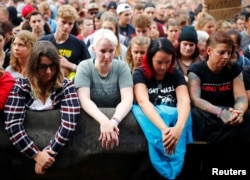Tens of thousands of people attended an anti-racism concert Monday in the German city of Chemnitz to protest growing anti-migrant sentiment.
The concertgoers thronged the free event Monday holding anti-racism posters and chanting "Nazis out." Several punk and indie bands were performing at the event under the motto "There are More of Us."
The concert follows riots in the eastern German city last week, with thousands of far-right supporters and soccer hooligans overwhelming local police and beating people in the streets who appeared to be foreigners, while flashing illegal Nazi salutes.
The trigger for the violence was the stabbing death of German carpenter Daniel Hillig, who was killed during a brawl with a pair of asylum-seekers from Syria and Iraq.
The stabbing came at the end of a street festival celebrating the 875th anniversary of Chemnitz, a declining Saxon industrial town of drab Communist-era apartment blocks with a population of 250,000.
Concert organizers said Monday's performance began with a moment of silence in memory of Hillig. They said the event was not a "festival or a party" but a chance to "show solidarity with all those who have been attacked by neo-Nazis."
Earlier Monday, a spokesman for German Chancellor Angela Merkel condemned those who participated in the far-right marches in Chemnitz last week.
Steffen Seibert said marches by "violence-prone right-wing extremists and neo-Nazis have nothing in the least to do with mourning for a person or with concern for a city's cohesion," he said.
The criticism was rejected by far-right party Alternative for Germany (AfD) which, along with anti-migrant group PEGIDA, led last week's demonstrations.
"An entire state and its people are vilified here in general because there is a distinct and understandable resentment about the circumstances," Joerg Meuthen, AfD co-chief, said Monday.
Federal authorities and neighboring German states have sent police reinforcements to Saxony to confront any repeat of the violence.
Tensions over migrants have roiled German politics since 2015, when Merkel announced an open-door policy for war refugees from the Middle East that saw more than 1.2 million admitted.
Merkel's controversial immigration policy fueled the rise of the AfD. The group's electoral performance in last year's elections, in which it seized nearly 100 seats in the Bundestag, marked a startling new phase in the party's progress from the fringe of German politics closer to the center of power in Berlin.









